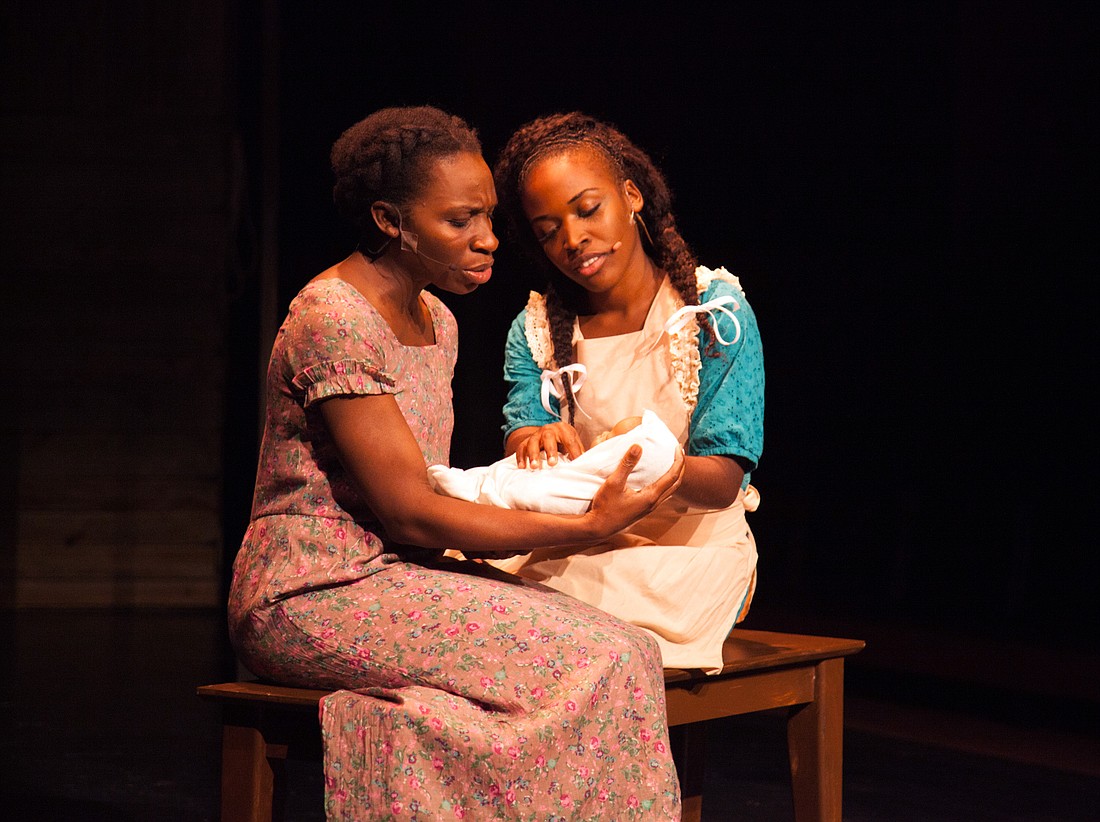- April 19, 2024
-
-
Loading

Loading

Alice Walker’s “The Color Purple” tells the tale of a young black woman growing up in rural Georgia in the early 20th century. Westcoast Black Theatre Troupe is now staging a musical adaptation of Walker’s novel. It seems like an odd candidate for a musical, at first. Like making a musical out of the Book of Job.
Celie Harris (Apphia Campbell) is the young woman in question. She suffers. Then she suffers some more. Her father impregnates her — twice — and gives her children away. He sells her to an abusive man (Cecil E. Washington Jr.), along with a cow. That man, called simply “Mister,” crushes Celie’s spirit, beats her, works her like a dog, cuts her off from her sister Nettie (Khadijah Rolle) and hides her sister’s letters.
Unlike Job, Celie doesn’t suffer from so-called “acts of God.” Celie’s pain is all in the family. Its source is exploitation, indifference and pure human meanness. In the end, she triumphs. But she walks a long hard road before she does.
That might not sound like too much fun. But it is. Marsha Norman (of “‘Night Mother” and “The Secret Garden” fame) wrote the life-affirming script, incorporating material from the Pulitzer Prize-winning book and Menno Meyjes’ screenplay, as well. Norman distills Walker’s meandering, epistolary narrative with fast-paced, crackling dialog.
Brenda Russell, Allee Willis and Stephen Bray created the music and lyrics. Their score is a rainbow of gospel, jazz, Delta blues and West African beats. The high-energy music feels authentic, and it’s nicely played by a band under John Bronston’s musical direction.
James Harkness (one of the original Broadway cast members) directs this sprawling tale, which could easily lose form and shape, if he didn’t keep his eye so firmly fixed on the story’s characters and the cultural code that defines their lives.
A huge cast puts it all together with strong performances, great singing and heart. Here are just a few highlights:
Campbell is heart-wrenching as Celie — a character who’s beaten down to nothing as a child and still manages to stand tall as an adult. Until he repents, Washington Jr.’s character is an evil S.O.B., constantly stewing in his own bitterness and taking it out on Celie. Shug (Neyce Pierre) is the bitter pill that Mister’s chewing on — an incandescent roadhouse singer and Mister’s sometime love interest, but never really “his.” (She’s Celie’s love interest too — much more explicitly than in Spielberg’s movie. Celie doesn’t possess her either.) Sofia (Dametria “Dee” Selmore) stands out as a strong black woman who speaks her mind. Her husband, Harpo (Joel Patrick King), doubts his masculinity because he can’t boss Sofia around. Celie advices him to beat Sofia, either out of jealousy or the Stockholm Syndrome. An uneasy moment. One of many.
This is an evening of feel-good theater. But those good feelings are earned.
“The Color Purple” is a nuanced investigation of identity and its number one enemy: bullying. The white bullies of this world stay off-stage, although they’re a constant presence. Sadly, oppressed people also oppress themselves. Psychologists call that, “the internalized judgment of the social other.” You could also call it the bully in the heart. And it’s the meanest bully of all.
True to its source material, this musical asserts that the lines of race and gender blur. The big question it asks: How can you be your true self when someone’s pushing you around? Somehow, Celie does. Life knocks her down, but she stubbornly keeps getting back on her feet. Eventually, she stays that way.
That seems to be the answer.